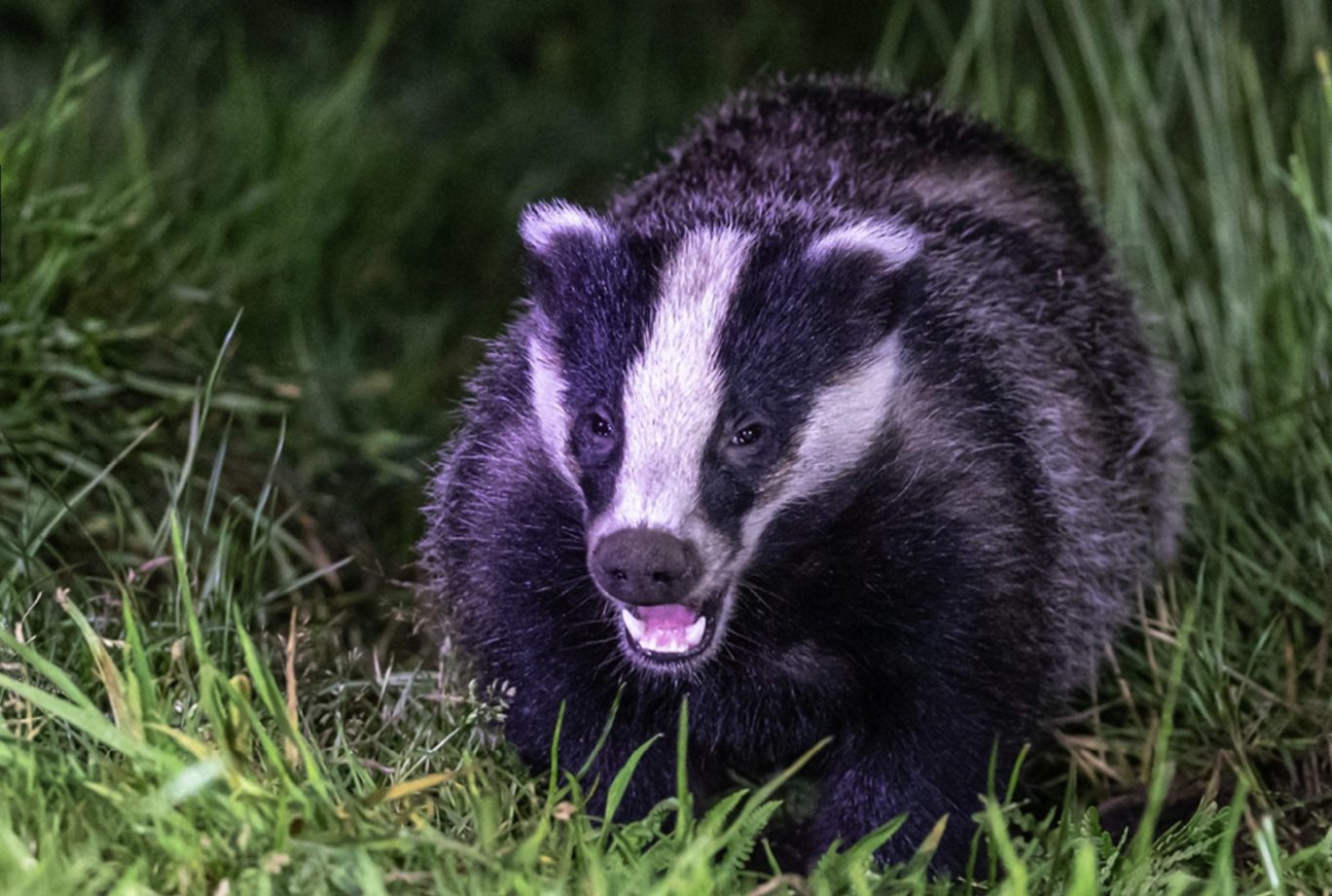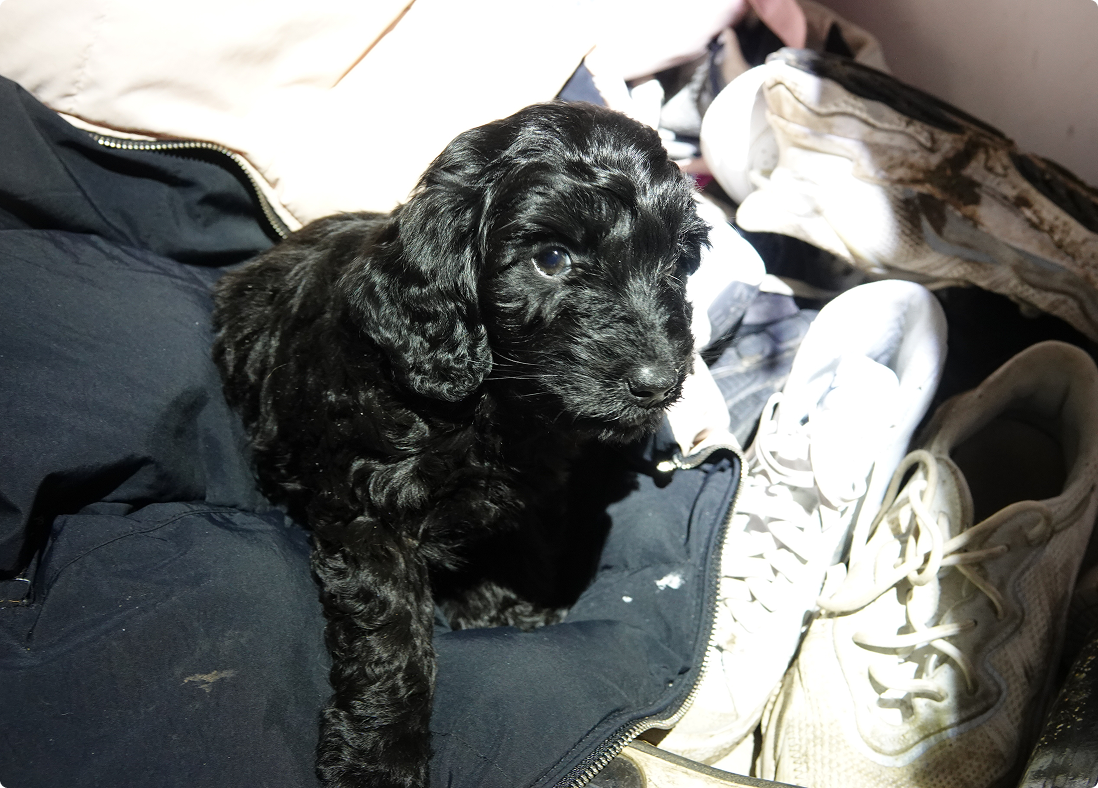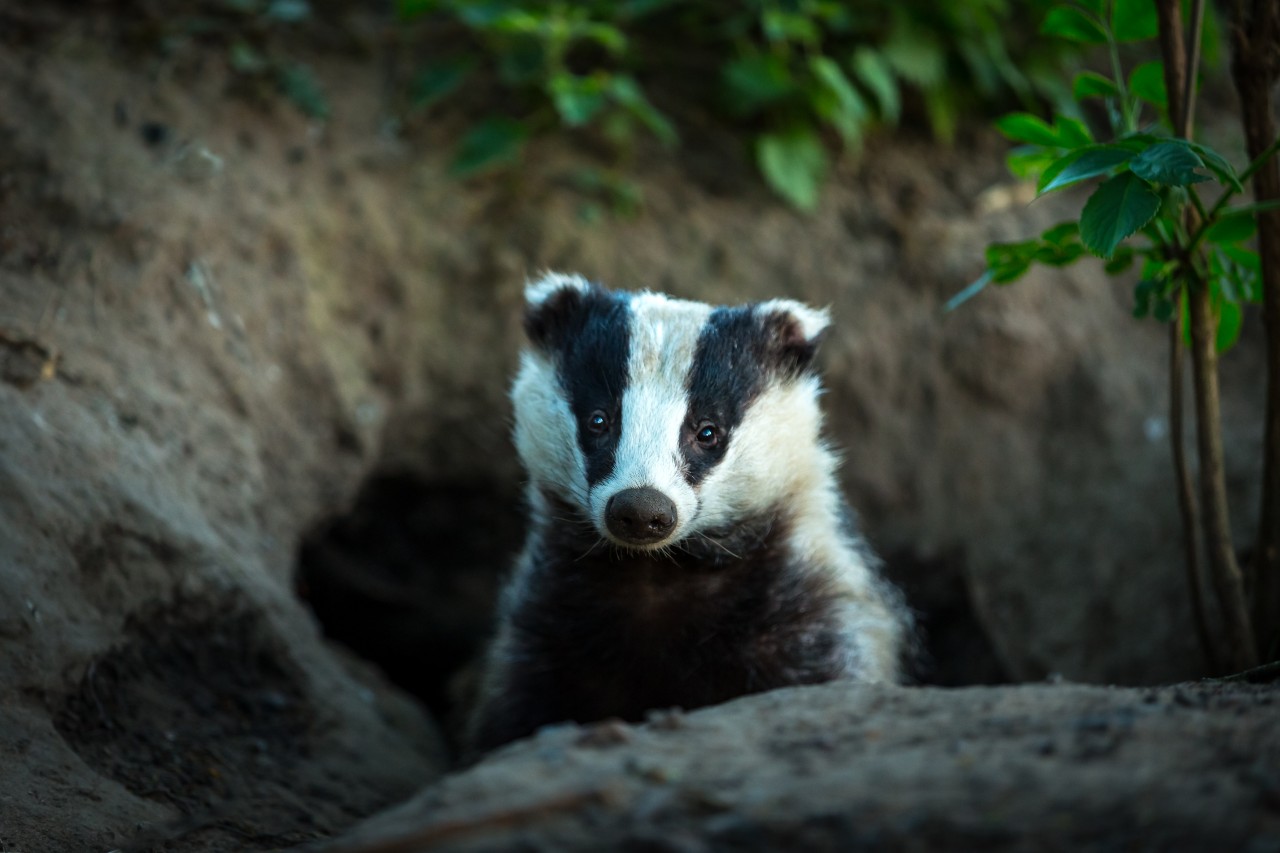
Badger
Although there is a significant population spread across mainland Scotland, the chances of seeing a badger in the wild are slim.
Badgers are nocturnal creatures who live underground and generally avoid people wherever possible.
They may be elusive but, if you are lucky enough to see one, there’s no mistaking a badger! With their distinctive black and white-striped faces and bushy tails, badgers are unlike any other mammals in Scotland. Measuring in at roughly the size of a spaniel makes them Scotland’s largest land carnivore.
Where do badgers live?
Badgers are most commonly found in woodland areas. They thrive on socialising with their own kind and live in family-like groups in an underground network of tunnels called a sett. They often have more than one sett across their territory.
Whilst fox dens are likely to be surrounded by fur and feathers, badger setts are easily distinguished by their large, tidy entrances and close-by latrine pits where they do the toilet. That’s right – badgers are toilet-trained wildlife!
What do badgers eat?
Badgers leave their setts at night to forage for their favourite food – earthworms.
They also feast on bramble berries, nuts and seeds as well as small animals such as mice, rats and amphibians. Their fantastic sense of smell and long claws are a great help in sniffing out and catching a meal.
That’s wild
Badgers can eat several hundred earthworms a night!
When are badger cubs born?
Female badgers usually give birth to two or three cubs in January or February. The cubs spend the first two or three months underground, emerging from their sett in the spring once they’ve been weaned from their mother’s milk.
Do badgers live in gardens?
Badgers rarely visit urban gardens however, they may venture into larger, rural gardens looking for a good meal. In their search for earthworms, they can cause damage by trampling plants and digging up areas of grass and soil.
The most humane and long-term solution to deter badgers is to remove or stop access to whatever it is that’s attracting them, whether this is food or shelter. However, do keep in mind that badgers and their setts are protected by law under the Protection of Badgers Act 1992.
It is an offence to interfere with a live badger or an active sett. Potential penalties include a maximum of twelve months imprisonment and/or a £40,000 fine. Under limited circumstances, such as human safety, essential development etc., licenced individuals can use lethal methods of control.
Persecution of badgers
Badger baiting or animal fighting
Badger baiting has been illegal in the UK for decades and we strongly oppose the killing of any animal for ‘sport’. These animal fights are often associated with other organised crime.
Badger baiting involves digging a badger out from underground, while people wait to set their dogs on the wild animal in a fight to the death. When forced to fight for their lives, badgers are ferocious. Baiting may kill a badger, but that badger can seriously injure and permanently disfigure the dogs involved too.
If you’re concerned badger baiting may be happening in your local area, keep an eye out for these signs:
- People in rural locations with spades and dogs, especially at unusual times such as late at night.
- Terriers wearing locator collars so baiters know where to dig. They may also be wearing chin guards to try and protect them from injury.
- People with groups of bigger dogs, such as lurchers, to fight any badgers flushed out of their setts.
- A ‘crowning down hole’. This is usually dug lower down the slope from the badger entrance to allow baiters to get close to the badger’s bedding or nesting chamber.
Our Special Investigations Unit will investigate reports of badger baiting. They also report people for prosecution if they find evidence they have taken part in this cruel blood sport.
If you know of anyone involved in animal fighting, or suspect it is happening in your area, you can report it to Police Scotland’s Wildlife Crime Unit by calling 101.
Snares and traps
Snares and traps are indiscriminate. Badgers sometimes get caught in snares and traps which have been legally set to catch other species.
We support the outright ban on the use of snares and we want tighter regulations around traps due to the level of suffering caused.
Snares must be set correctly by a trained and authorised individual. All snares must have a ‘stop’ on them to prevent them from over-tightening. A legal snare or trap will have an ID tag and must be checked every 24 hours. By law, any non-target species caught must be released unharmed.
It is illegal for anyone to tamper with a legally-set snare or trap so we would ask the public not to attempt this. If you suspect a device is set illegally, call our helpline immediately on 03000 999 999.
Common problems for badgers
Road traffic accidents
Sadly, many badgers are hurt or killed in road traffic collisions every year. Read further advice about badgers on the road.
You should report traffic fatalities, or any dead badger, to Scottish Badgers here.
Sick or injured badgers
If you find an injured or sick badger, please call our Helpline on 03000 999 999, open from 8am to 8pm every day.
Signs to be aware of include:
- Twitching.
- Not reacting to noise.
- Falling over.
- Not moving away when approached by a human.
- Open wounds.
- Breathing with mouth open or panting heavily.
- Lots of flies around the badger.
You should observe the badger until one of our animal rescue officers arrives to assist. Do not attempt to hold or touch the animal. Badgers can become aggressive if they are in pain or feel threatened; they can give a nasty bite and their sharp claws could cause serious injury, if you try to catch it.
You should also contact us if you find a badger during daylight hours as they may be struggling.
Badger cub above ground
Any badger cub discovered out with their sett before they are around 12 weeks old, or around the size of a domestic cat, is likely to need our help. Please contact our helpline on 03000 999 999.
Supporting documents
Hunting with Dogs (Scotland) Bill
Wildlife and Natural Environment (Scotland) Act 2011 – Legislation on the use of snares

Puppies across Scotland need your help
Please consider giving a monthly donation today. Give Scotland’s animals the gift of safety this winter and beyond. The criminals involved in the low-welfare puppy trade never stop. And with your help, neither will we. Every £1 matters to puppies like Winnie.
